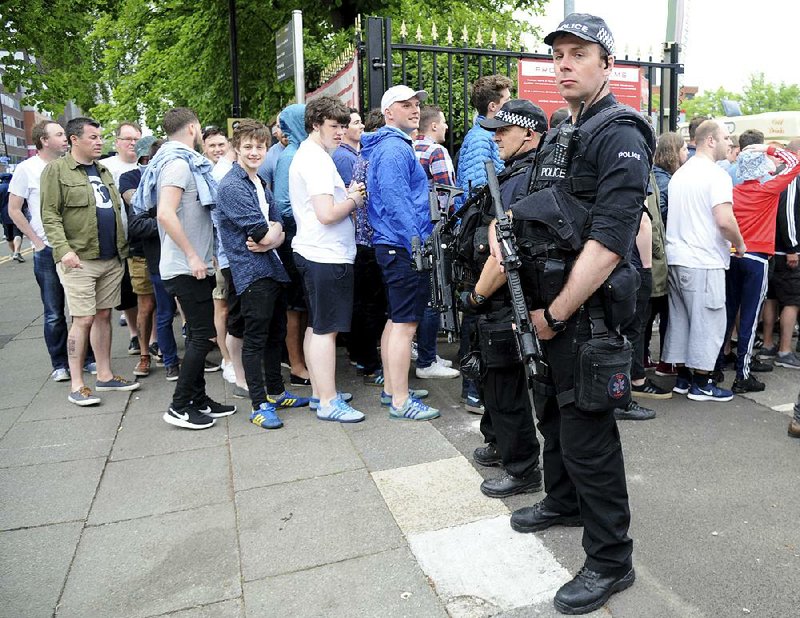MANCHESTER, England -- Britain reduced its terrorism threat level a notch, from "critical" to "severe" on Saturday, as authorities said they had made significant progress in unraveling the plot behind the Manchester concert bombing.
But police said more arrests were expected, and security was tight across Britain as hundreds of thousands of people attended soccer matches, concerts and other big holiday-weekend events.
Also Saturday, police released surveillance-camera images of the bomber, Salman Abedi, on the night of the attack.
The photos released by police show Abedi, a 22-year-old Briton of Libyan descent, wearing sneakers, jeans, a dark jacket and a baseball cap. The straps of a knapsack are visible on his shoulders.
Greater Manchester Police Chief Ian Hopkins and Neil Basu, the national coordinator of counterterrorism policing, urged people to contact police if they had information about Abedi's movements between May 18 and Monday night, when the bombing occurred.
"In the past five days, we have gathered significant information about Abedi, his associates, his finances, the places he had been, how the device was built and the wider conspiracy," they said in a statement.
"Our priorities are to understand the run-up to this terrible event and to understand if more people were involved in planning this attack," the statement said.
Abedi died during the attack.
[INTERACTIVE: Timeline, map of attack]
British Prime Minister Theresa May said "a significant amount of police activity" and several arrests had led to the level being lowered. But she urged Britons to remain vigilant and said soldiers would remain at high-profile sites throughout the holiday weekend. The troops will gradually be withdrawn beginning Monday, she said.
A severe threat means an attack is "highly likely," according to the scale set by Britain's Joint Terrorism Analysis Centre. Until it was raised Tuesday, it had stayed at severe since mid-2014.
Assistant Commissioner Mark Rowley, Britain's top counterterrorism police officer, said authorities have dismantled a "large part" of the network around Abedi, who killed 22 people and wounded dozens by bombing the Ariana Grande concert Monday.
But he said there were still "gaps in our understanding" of the plot, as investigators probed Abedi's potential links to jihadis in Britain, Europe, Libya and the Middle East.
Police made two more arrests Saturday in Manchester on terrorism-related charges, bringing the number of suspects in custody to 11. All are men between the ages of 18 and 44. In addition, Abedi's father and younger brother were detained in Libya.
Police disclosed new details about Abedi's' movements, saying he returned to Britain four days before the attack. His father said Abedi was in Libya until earlier this month and had told family that he planned to go to Saudi Arabia on a pilgrimage, police said.
Police said they think Abedi assembled his bomb at a rented apartment in central Manchester that was raided by officers Wednesday.
Investigators have searched 17 properties, including Abedi's home in south Manchester and other houses in nearby districts.
Residents were evacuated from streets in the south Manchester neighborhood of Moss Side in what police called a precaution as one search was carried out Saturday. Photos showed an army bomb-disposal unit at the property.
One search was at an apartment in a Manchester high-rise that British media say was rented by Abedi in the months before the attack. Mohammed El-Hudarey, a friend of the landlord, said that after Abedi moved out about six weeks ago, there was debris, including metal rods and cut-up fabric, and a strong smell of chemicals.
"We thought he must have been a drug dealer or doing witchcraft," El-Hudarey told the BBC.
Britain's health service said Saturday that 63 people injured in the bombing remained hospitalized, 20 of them in critical condition. A total of 116 people were treated in hospitals after the bombing.
Despite the alert, police have urged people to go out and enjoy themselves over the three-day holiday weekend.
Hundreds of soldiers replaced police at high-profile sites including Buckingham Palace and Parliament, and police armed with submachine guns have been deployed in city centers, transit hubs, tourist areas and at major events.
Armed police were on the streets Saturday outside London's Wembley Stadium, and security guards conducted extra bag checks, as 90,000 fans arrived for the FA Cup soccer final between Chelsea and Arsenal, one of the biggest sporting events of the year.
Information for this article was contributed by Rob Harris of The Associated Press.
A Section on 05/28/2017
